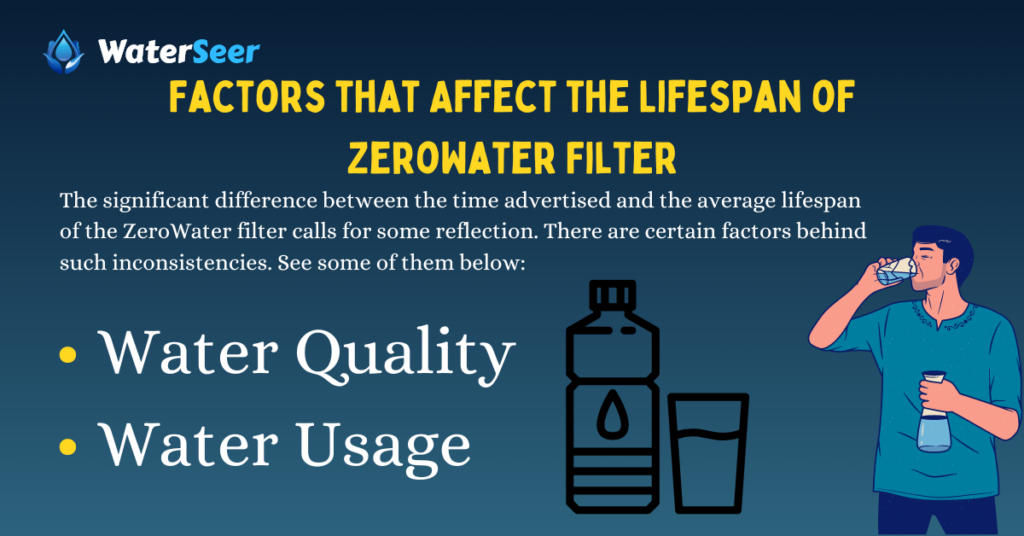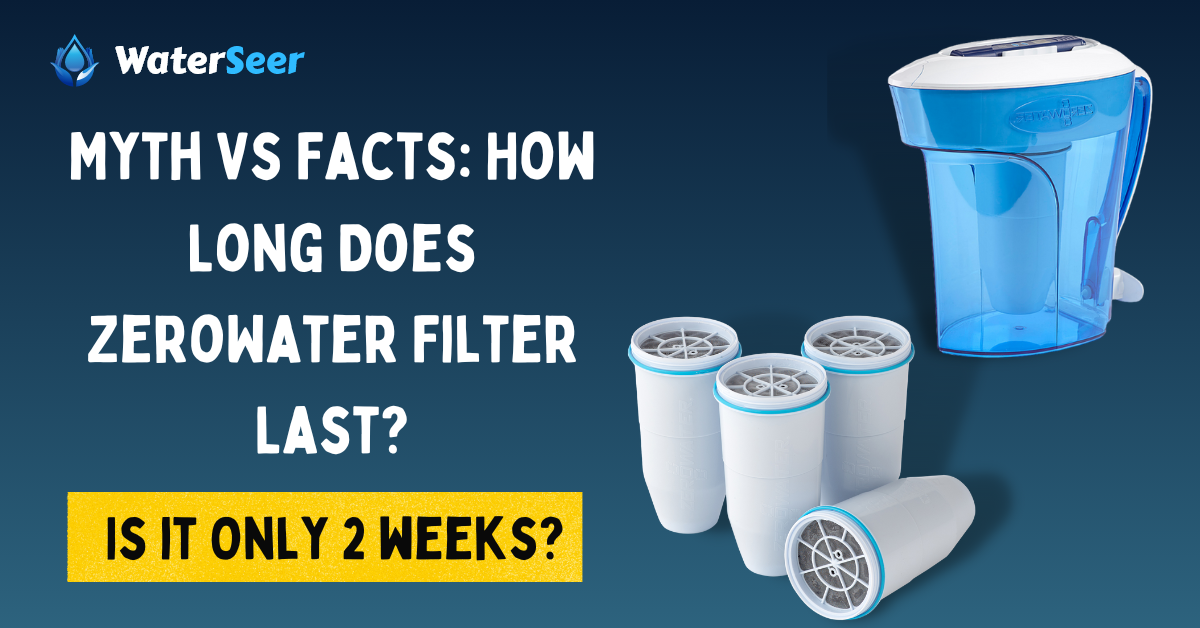People will continue to seek out clean water for their daily usage, especially because water contains different contaminants that can cause illness and damage our properties. It is vital to use a suitable water filtration system to remove impurities.
Among the different filtration systems available, the Zero Water filter is known for its superb cleaning ability. The manufacturers claim it has the most advanced cleaning system that removes even dissolved contaminants. The water pitcher is easily accessible due to its structure, and you can move it around.
Many other pitcher filters are available with similar structures as the ZeroWater filter; however, none comes close to its incredible ability to remove dissolved solids in the water.
Before you jump at the chance to get this filter, there have been numerous reports about its durability and the cost of replacing the unit. We’ve taken the liberty to find out the truth about its durability and to answer the question: does the ZeroWater filter last only two weeks? Let’s help you separate the myths from the facts.
Understanding ZeroWater Filtration System
ZeroWater is in a pitcher form, like a jug with a filtration system. It uses gravity to move the water through the filtration chamber and the nozzle.
Total Dissolved Solids (TDS) are all inorganic materials suspended in water and are measured in parts per million (ppm). ZeroWater prides itself on removing all the TDS in the water. The manufacturers were so sure that they included a TDS meter with every purchase so you could test the filter’s efficiency.
Such a level of trust is hardly seen from filter manufacturers for their products. ZeroWater filters clean the water of rust from old pipings, pesticides and fertilizers from agriculture, chlorine, lead, and microplastic. The unit features a five-star filtration system that ensures a more thorough purification.
There are standard 2-stage and 4-stage ZeroWater filters with decent purification levels. However, the 5-stage unit will always trump the others regarding efficiency. When water enters the top of the filter into the pitcher, gravity pulls it down through the filtration stages until clean water settles in the filter tank below.
Such high levels of purification efficiency are possible because the system uses an ion exchange process to remove all the TDS in the water. During the process, the ion exchange layer in the filter replaces the positively charged ions (cations) and the negatively charged ions (anions). Hydrogen ions replace cations, while anions are replaced by hydroxyl ions to form pure water.
How Long do ZeroWater Filters Actually Last? Myth Vs Fact
The marketing done for the ZeroWater pitcher is direct with bold claims. You would be forgiven for having some skepticism, especially if other pitcher filters have burned you before.
Statements like “it removed 99.9% of TDS can raise eyebrows, but its efficiency is not on trial today. Rather, we’re focusing on claims like “ZeroWater filters can last for about 40 gallons of purified water”. This means you can get 40 gallons of filtered water from your ZeroWater pitcher before you replace it. On average, 40 gallons is just over three months of usage.
With such glowing marketing statements, it is surprising to see several complaints from buyers about a lemony taste within a short period of using the filter. This has led to doubts about their marketing claims. So, does ZeroWater last for 40 gallons? If not, how long does it really last?
Despite its 40-gallon claim, you’re unlikely to get purification near that amount of water. In reality, you would get between 10 to 20 gallons, about one to two months of average usage. After which the infamous lemony water taste takes over.
The ion exchange layer contains a fixed amount of ions it can trade during the purification process. When one of the ions in the layer is depleted, the exchange is incomplete, resulting in a reaction different from H2O.
The difference in the advertised period and the actual lasting time is not due to a manufacturing defect but because of the varying levels of TDS in the water. This is why we’ll see the factors that affect ZeroWater longevity below.
Factors that Affect the Lifespan of ZeroWater Filter

The significant difference between the time advertised and the average lifespan of the ZeroWater filter calls for some reflection. There are certain factors behind such inconsistencies.
See some of them below:
1. Water Quality
ZeroWater filter manufacturers assume a low TDS amount in the water when estimating lifespan. In hindsight, the amount of impurities in the water varies and affects the filter lifespan. With more TDS in the water, your ZeroWater filter must do more work to deliver pure water.
If you’re using water from a source with better quality, you should expect longer ZeroWater usage. But the same cannot be said for water laden with various impurities, as they’ll quickly block the filter.
2. Water Usage
Zero water manufacturers estimate that the filter will last about 40 gallons of purified water and further approximated that it should last for about three months. However, this water usage is not universal, as people use water differently.
Some homes use a significantly higher amount of water than average, which means a shorter lifespan in terms of months for the filter. Homes with heavy usage will overwork the filter quickly, making it impossible to reach the approximate date. The level of water consumed affects the longevity of the filter.
How to Determine the Right Time to Replace your ZeroWater Filter?

At face value, determining the time to replace the filter can be daunting. However, with a little help, you can estimate the best time to replace old ZeroWater filters with great accuracy.
Here’s how to do that:
1. Taste of Drink Water
It is only right that taste leads this list, considering it is the leading complaint about old ZeroWater filters. Many users complain of a lemony or fishy taste after a short period of using the filter. One of the easiest ways to know if you should replace that ZeroWater filter is by tasting the water from it.
If you notice any acidic, fishy, or lemony taste in the water, that’s an indication that you need to replace the filter. The various smells from the water occur when the ion exchange is ineffective.
2. Use the TDS Meter
Here’s an obvious way to determine the correct time to replace an old ZeroWater filter. The manufacturers have made this even easier by including a TDS meter showing when the filter is no longer effective. ZeroWater manufacturers claim the filter can remove TDS to zero, so when the amount of TDS rises above zero, it indicates the filter is beyond its lifespan.
To use the TDS meter, remove the end cap and turn the meter on by pressing the power button in front. Submerge the device in water and check the reading. The reading shows the TDS in the water in parts per million (ppm).
3. Water Flow Rate / Filtration Rate
When the filter no longer cleans the water, contaminants start to block the pores and, with time, slow the flow of water through the chamber. ZeroWater filters use gravity to push the water through, so naturally, it would have a slow flow. However, this can significantly reduce further with more impurities blocking the area.
Benefits of using an Efficient ZeroWater Filter

If you’re looking for more reasons to maintain an efficient ZeroWater filter, here you go:
1. Complete TDS Removal
This is arguably the most effective pitcher filter for TDS removal, and it comes with a water quality meter to prove it. If you’re looking for an excellent way to remove all the dissolved solids in your water, the ZeroWater filter is ideal.
2. Water Quality Meter
All ZeroWater filters come with a TDS or water quality meter that measures the total dissolved solids in the water anytime you want. Having such a device handy allows you to always be in control. You can know when your water source has taken in more impurities or when your filter is no longer effective.
3. Cost Saving
For all the talk of expensive ZeroWater filter replacements, it features a return program that saves you a lot of money. Rather than throwing away the old filter and littering the environment, you can return this filter to ZeroWater and get a 50% discount on your next purchase. This means if you return two old filters, you get a $10 voucher which is equivalent to a new filter.
FAQ’s
Do you have any challenges with the ZeroWater filter?
Here are questions about it and their answers:
How many gallons of water can a ZeroWater filter purify?
The manufacturers claim it can purify 40 gallons of water, but this figure may fall to about 20 to 25 gallons depending on water quality. The filter will only last for a while where the amount of TDS in the water is high.
How often should I change the ZeroWater filter?
The ideal period is between one to three months, with the quality of water and usage the primary factors affecting the exact lifespan.
Which system do ZeroWater filters use?
ZeroWater filters use the ion exchange process to purify water. It replaces the impurities with ions from its ion exchange layer.
How can I make my ZeroWater filter last longer?
A quick way to increase the lifespan of your zero water filter is to reduce its workload. You can do this by passing the water through a pre-filter to remove some contaminants before entering the pitcher.
Conclusion
Removing TDS from water is a ZeroWater specialty, and it comes with a TDS meter to prove it. It also claims to filter about 40 gallons of water, subject to your situation. A high amount of TDS in the water and heavy usage will significantly reduce the lifespan of your filter.
If you’re looking for a convenient filter with a high TDS efficiency rate, the ZeroWater pitcher filter is the right choice.

